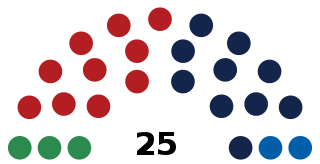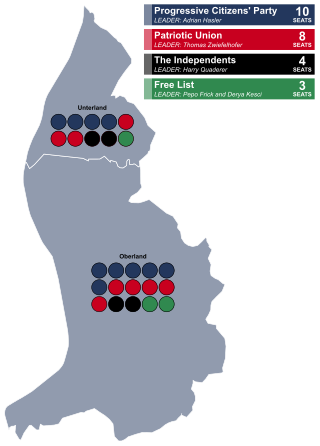Related Research Articles

Political identity came to the territory now occupied by the Principality of Liechtenstein in 814, with the formation of the subcountry of Lower Rhætia. Liechtenstein's borders have remained unchanged since 1434, when the Rhine established the border between the Holy Roman Empire and the Swiss cantons.

Alexander Frick was a politician from Liechtenstein who served as Prime Minister of Liechtenstein from 1945 to 1962. Frick is known for expanding Liechtenstein's foreign affairs and modernizing the country into a modern welfare state, while also serving over a period of economic boom in the country. He later went on to serve in the Landtag of Liechtenstein from 1966 to 1974 and as the President of the Landtag of Liechtenstein from 1966 to 1969.

The Landtag of the Principality of Liechtenstein, commonly referred to as the Landtag of Liechtenstein, is the unicameral parliament of Liechtenstein.

General elections were held in Liechtenstein on 3 February 2013, using a proportional representation system. Four parties contested the elections; the centre to centre-right Patriotic Union (VU), centre-right Progressive Citizens' Party (FBP), centre-left Free List (FL) and newly created right-wing populist alliance The Independents (DU).

The Independents is a right-wing populist Eurosceptic political party in Liechtenstein. In the 2013 parliamentary election, the first they contested, they won 29,740 votes (15.3%) and four seats in the Landtag.

Albert Frick is a politician from Liechtenstein who has served as the President of the Landtag of Liechtenstein since 2013.

General elections were held in Liechtenstein on 2 and 3 May 1882.

The Democrats for Liechtenstein is a political party in Liechtenstein. Formed as a splinter of The Independents in September 2018, the party initially held three seats in the Landtag of Liechtenstein. It won 11.1% of votes and two seats in the 2021 general election.

Daniel Risch is a Liechtensteiner politician who has served as the Prime Minister of Liechtenstein since 2021. He was previously Deputy Prime Minister 2017 to 2021, under the government of Adrian Hasler.

Georg Malin is a Liechtensteiner artist, sculptor, historian and politician. Between 1974 and 1978, Malin served as member of the governing council in the Liechtenstein government, for the Progressive Citizens' Party (FBP). He previously served as a member of the Landtag of Liechtenstein from 1966 to 1974, where he was also a member on the parliamentary delegation to the European Council.
Christine Wohlwend is a Liechtensteiner businesswoman, forensic technician, and politician who served in the Landtag of Liechtenstein from 2013 until 2017. Wohlwend represented the Oberland constituency as a member of the Progressive Citizens' Party, and also served as the party's parliamentary group spokeswoman.

Fritz Walser was a political figure from Liechtenstein who served as President of the Landtag of Liechtenstein from 1919 to 1921.
Pepo Frick is a physician and political figure from Liechtenstein who served in the Landtag of Liechtenstein from 2005 to 2013. He was the leader of Free List, alongside Conny Büchel-Brühwiler, until 2022.
Andreas Vogt was a carpenter and politician from Liechtenstein who served in the Landtag of Liechtenstein from 1926 to 1928. He faced controversy due to his self-declared republican and social democratic views.
Johann Ludwig Wachter was a politician from Liechtenstein who served in the Landtag of Liechtenstein from 1945 to 1953.

Sascha Quaderer is a politician from Liechtenstein who has served in the Landtag of Liechtenstein since 2021.
Dagmar Bühler-Nigsch is a politician from Liechtenstein who has served in the Landtag of Liechtenstein since 2021.
Thomas Büchel is a politician from Liechtenstein who served as the Deputy Prime Minister of Liechtenstein from 1993 to 1997, under the government of Mario Frick. He previously served in the Landtag of Liechtenstein in 1993.
Johann Baptist Quaderer was a politician from Liechtenstein who served in the Landtag of Liechtenstein from 1862 to 1872. He was also the first mayor of Schaan, serving from 1862 to 1870.
References
- ↑ "Quaderer, Harry". Members (in German). Landtag of Liechtenstein. Retrieved 13 August 2015.
- ↑ Quaderer, Harry (Harald); Historiches Lexicon;
- ↑ "Harry Quaderer" (in German). Die Unabhängigen. Archived from the original on 23 September 2015. Retrieved 13 August 2015.
- ↑ Quaderer, Harry (Harald); Historiches Lexicon;
- ↑ Lansford, Tom, ed. (2014). "Liechtenstein". Political Handbook of the World 2014. Thousands Oaks, CA, US: CQ Press. p. 848. ISBN 9781483333274 . Retrieved 13 August 2015.
- ↑ Quaderer, Harry (Harald); Historiches Lexicon;
- ↑ Aktuelles; die Unabhängigen;
- ↑ Kandidaten 2013; Landtagswahlen;
- ↑ Quaderer, Harry (Harald); Historiches Lexicon;
- ↑ Aktuelles; die Unabhängigen;